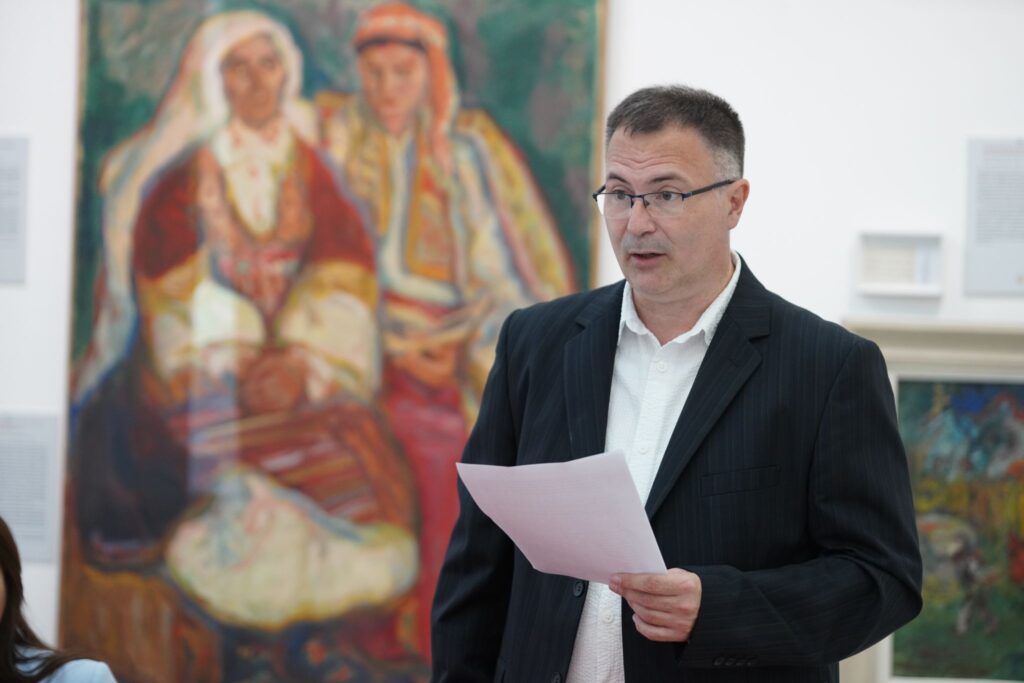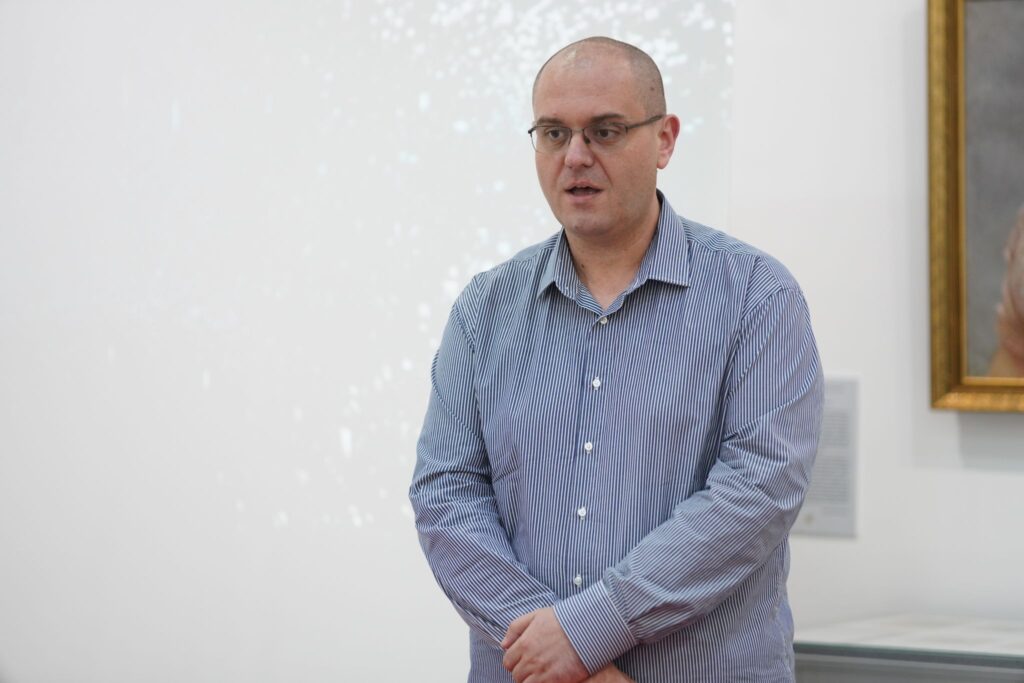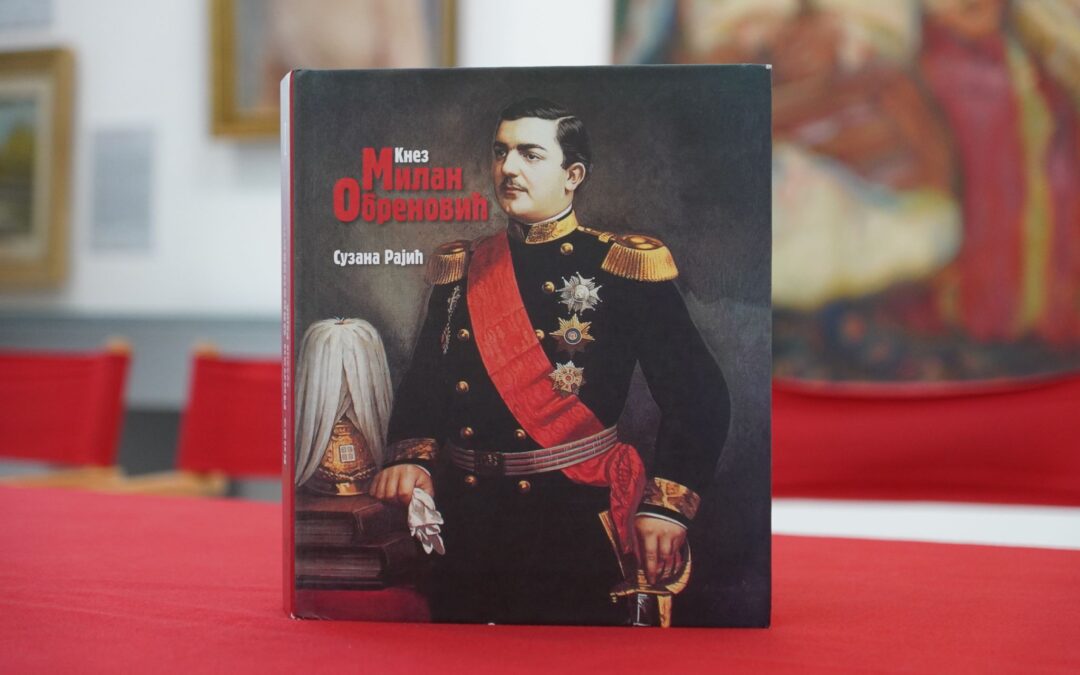The promotion of the book by professor Suzana Rajić “Prince Milan Obrenović (1854–1881): From Baron to a Sovereign” was held at the Gallery of the National Museum Kraljevo, on Tuesday, September 16th, 2025, starting at 7 p.m.
Darko Gučanin, director of the National Museum Kraljevo, welcomed the audience and introduced the participants. He presented the biography of the author and emphasized the significance of this monumental work, which offers a comprehensive and well-documented account of the life and reign of one of Serbia’s most controversial rulers. Suzana Rajić, PhD, professor at the Faculty of Philosophy of the University of Belgrade, and Head of the Department for the History of the Serbian People in the Modern Era, is recognized as a leading researcher of 19th 19. and 20th century Serbian history. She is the author of numerous studies and publications on Serbian dynasties, state institutions, and foreign policy. Darko Gučanin noted the challenges of writing King Milan’s biography, given the vast number of documents, conflicting sources, and the influence of propaganda and ideological interpretations. The book presents facts that dismantle long-standing prejudices, portraying Milan’s life—from childhood and political challenges to his private relationship with Queen Natalija and the analysis of the Secret Convention. This major work corrects many injustices in the historical memory of King Milan and invites a reevaluation of his place in Serbian history, especially considering his contributions to independence and the development of key institutions such as the National Theatre, National Museum, and National Library.

The first volume of the monograph was presented by Danko Leovac, PhD, associate professor at the Faculty of Philosophy of the University of Belgrade. He emphasized that Prince Milan Obrenović IV, the first sovereign of modern Serbia, is one of the few rulers deserving of such an extensive three-volume biography.
Leovac described the complexity of the research, which lasted over a decade and involved reviewing tens of thousands of archival documents from Serbian and European archives. He referred to Milan as the “black raven of our history,” a label given by his radical opponents during his lifetime.
Due to the destruction of domestic archival material after 1903, sources from Vienna, Berlin, Moscow, Bucharest, and London were crucial. Leovac focused on Milan’s childhood, mentioning controversies surrounding his birthplace and the origins of his mother, Maria Katardži. He described Milan’s early years as both joyful and tragic—losing his father young and being raised by his uncle, Prince Mihailo, who sent him to study in Paris.
Leovac recounted Milan’s ascension to the throne at age 14 in 1868 and praised Dr. Rajić’s explanation of the legitimacy of his succession. He described the difficult years Milan spent in isolation due to fears of assassination, which left lasting psychological effects. Milan transitioned from a ruler who received the last berat from the Sultan to a sovereign of an independent and internationally recognized Serbia.
Leovac then discussed Milan’s leadership during the Great Eastern Crisis and his command in the First and Second Serbian-Ottoman Wars. He highlighted Milan’s vision for a modern Serbian army and the reforms that laid the foundation for its later success in the Balkan and First World Wars.
Although often criticized for his Austrophilic policies and the signing of the so-called Secret Convention, Milan achieved major diplomatic success at the Berlin Congress in 1878, securing independence and territorial expansion, followed by Serbia’s proclamation as a kingdom. Leovac praised Milan’s foreign policy as masterful and peaceful, and emphasized his contributions to education, culture, art, and literature, as well as his relationships with key political figures of the time. He concluded by stating that Suzana Rajić’s work offers the most realistic portrayal of this complex ruler.

In her deeply inspired address, professor Suzana Rajić reflected on the dilemmas she faced while planning this biography – the first dedicated to King Milan in over 100 years, since the work of Slobodan Jovanović. She noted that even Jovanović, despite his expertise, succumbed to the prevailing atmosphere of denying Milan’s positive traits. She also referenced Vladimir Ćorović, who wrote critically about Milan but later admitted that his policies could be understood and defended if not for the personal animosity toward him.
Rajić stated that she dedicated this work to future generations, believing that few others would revisit these perspectives or explore new arguments and documents. She emphasized that the nearly 1,000-page biography covers the first 25 years of Milan’s life, including his specialized education under top French professors led by François Hiet, funded annually by Prince Mihailo with 25,000 francs.
Although Milan was the legitimate heir, he was an unwanted ruler, lacking political support and family in Serbia – only his grandmother Tomana and cousin Katarina. Rajić clarified events involving Milivoje Petrović Blaznavac and the Belgrade garrison, noting that the army did not proclaim Milan as prince but merely facilitated the legal succession.
For ten years, Milan struggled for recognition, only gaining public acceptance after his victories in the 1876–1878 wars, followed by a national tour in 1879.

Rajić recalled the threats, conspiracies, and staged assassination attempts he faced, and described Serbia’s state after expanding its territory by 28%.
She emphasized how Milan, together with Serbia, grew from a weak vassal principality into a recognized and independent sovereign state, engaging directly with crowned heads across Europe. Milan was the first Serbian ruler to establish bilateral relations with the Ottoman Empire, which had ruled Serbia for five centuries.
The 1881 political treaty with Austria-Hungary, dubbed the Secret Convention by radicals, was the first international agreement affirming Serbia’s strategic interest in expanding southward and securing support from a major power. This marked the beginning of Milan’s state-building vision, necessary due to Serbia’s 1,700 km of hostile borders, with only 100 km bordering friendly Romania.
Suzana Rajić cited historian Grgur Jakšić, who called the treaty an act of high political foresight. She noted that 86% of Serbia’s trade was conducted with its northern neighbor and refuted the prevailing view that the Serbian-Austrian trade agreement was unfavorable—supporting her claim with a facsimile of the treaty in the monograph.
She also highlighted Milan’s commitment to education, teacher training, and opening much-needed schools, as 43% of the population was under 15 years old. She concluded with a promise to compile a list of all the facts uncovered during her research that differ from what has been known in historical scholarship.
The evening ended with questions from an enthusiastic audience, and a warm invitation was extended to Suzana Rajić to attend the upcoming celebration of Kraljevo’s Name Day.
